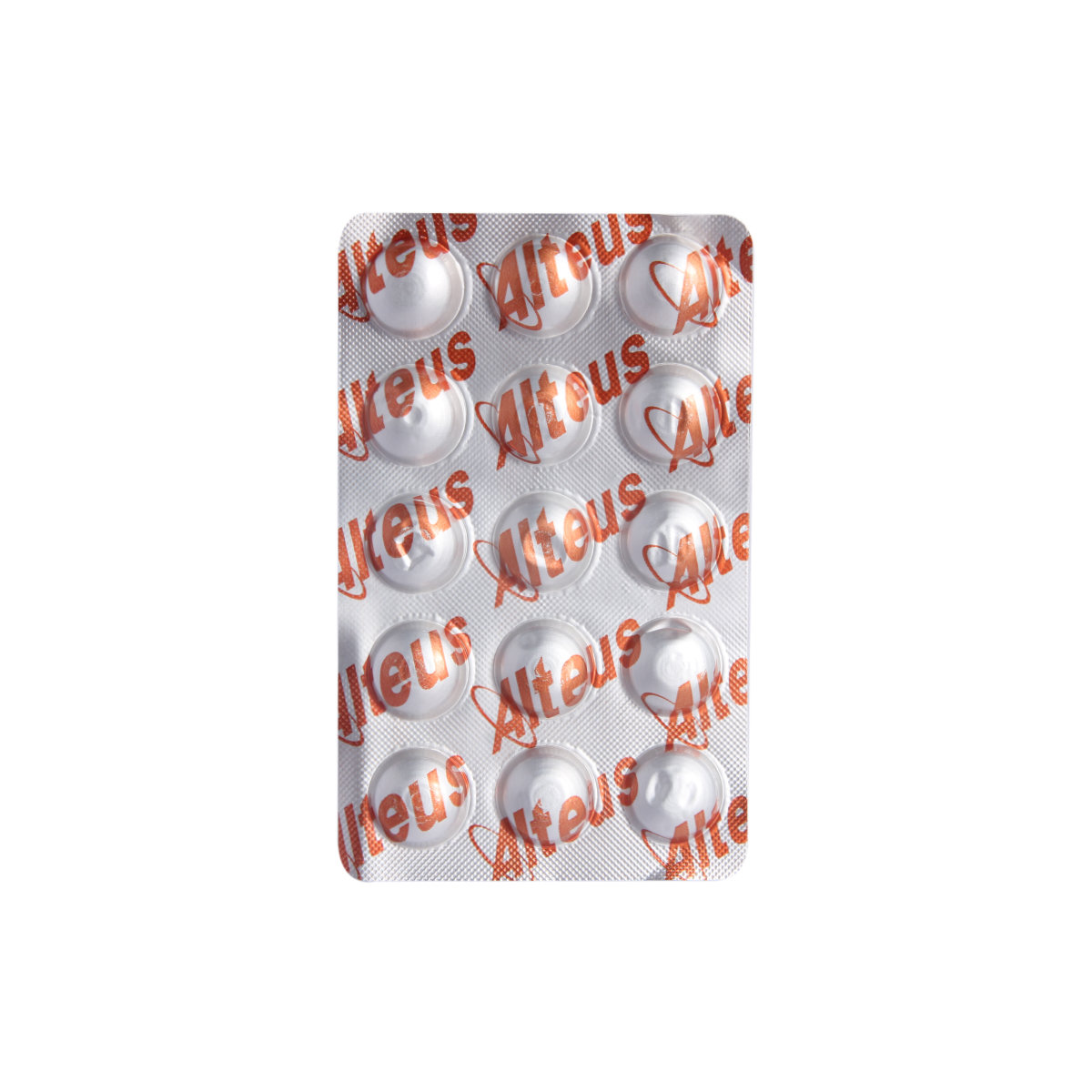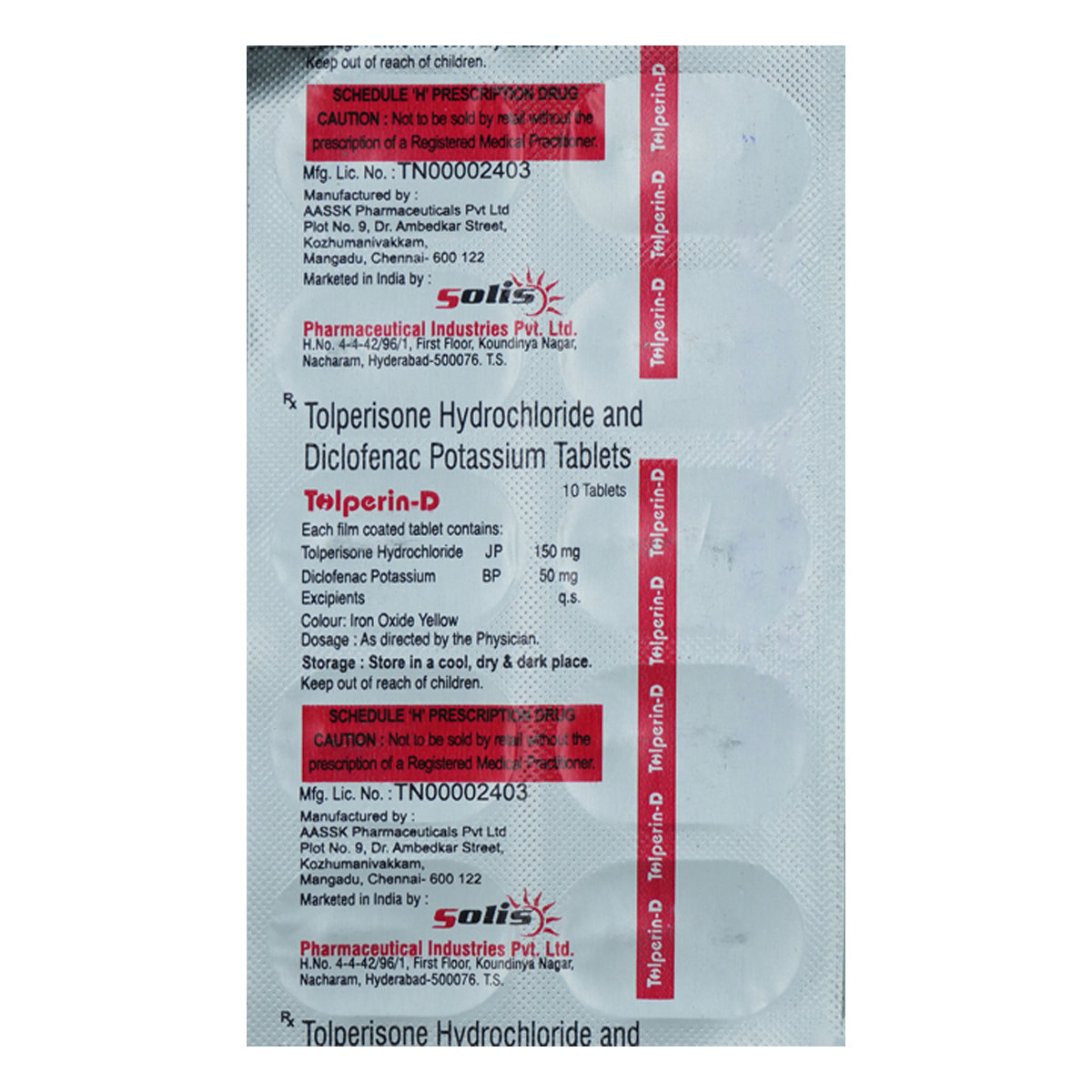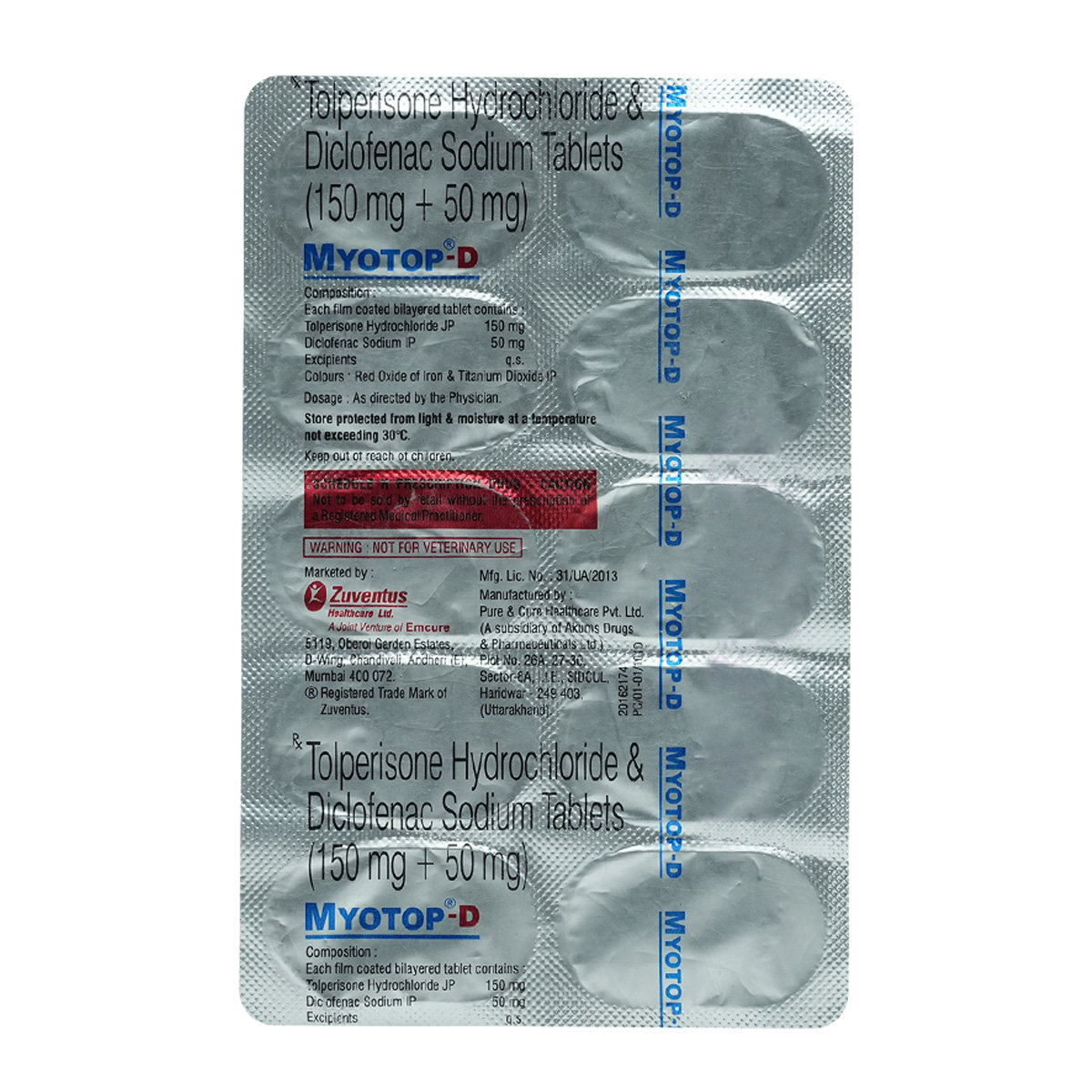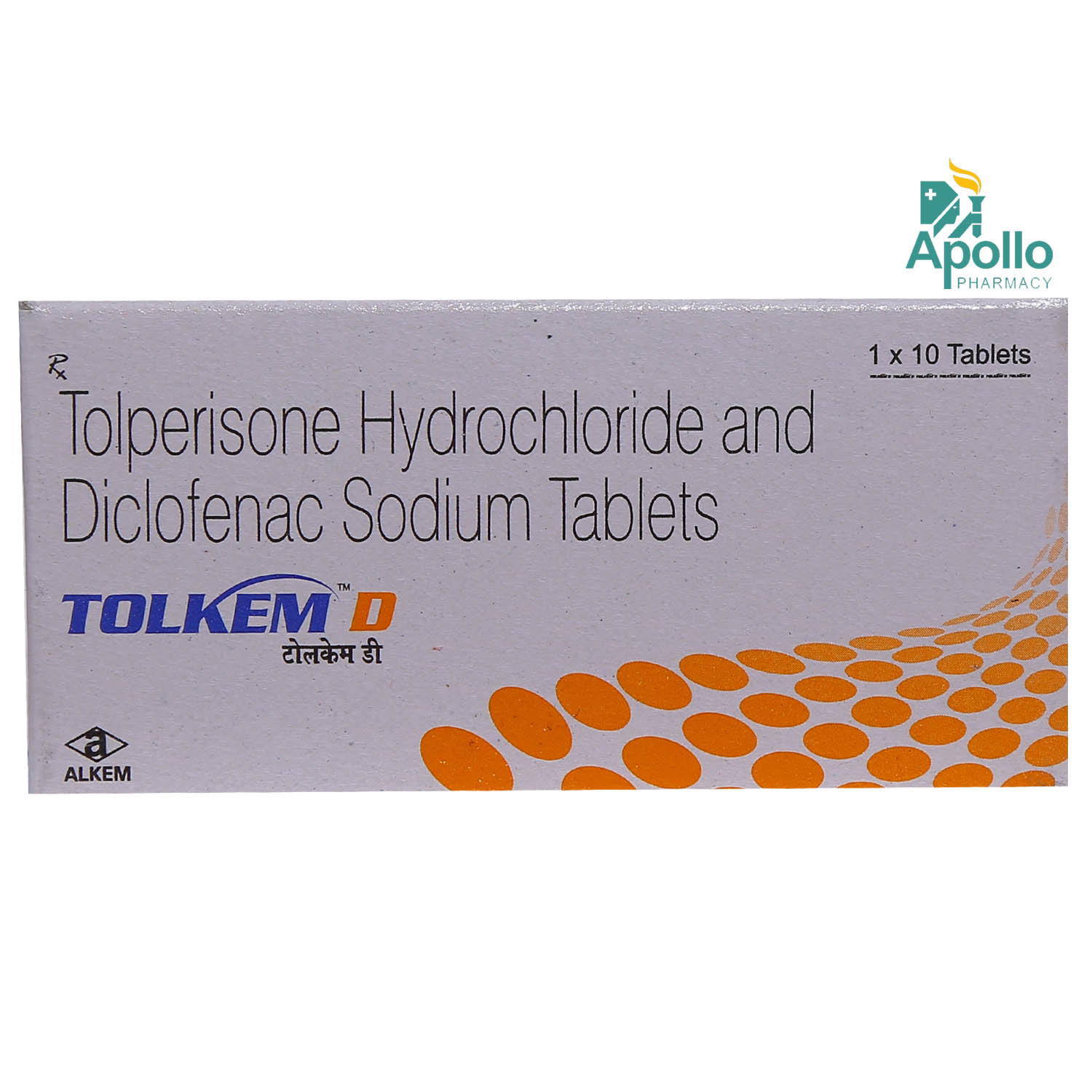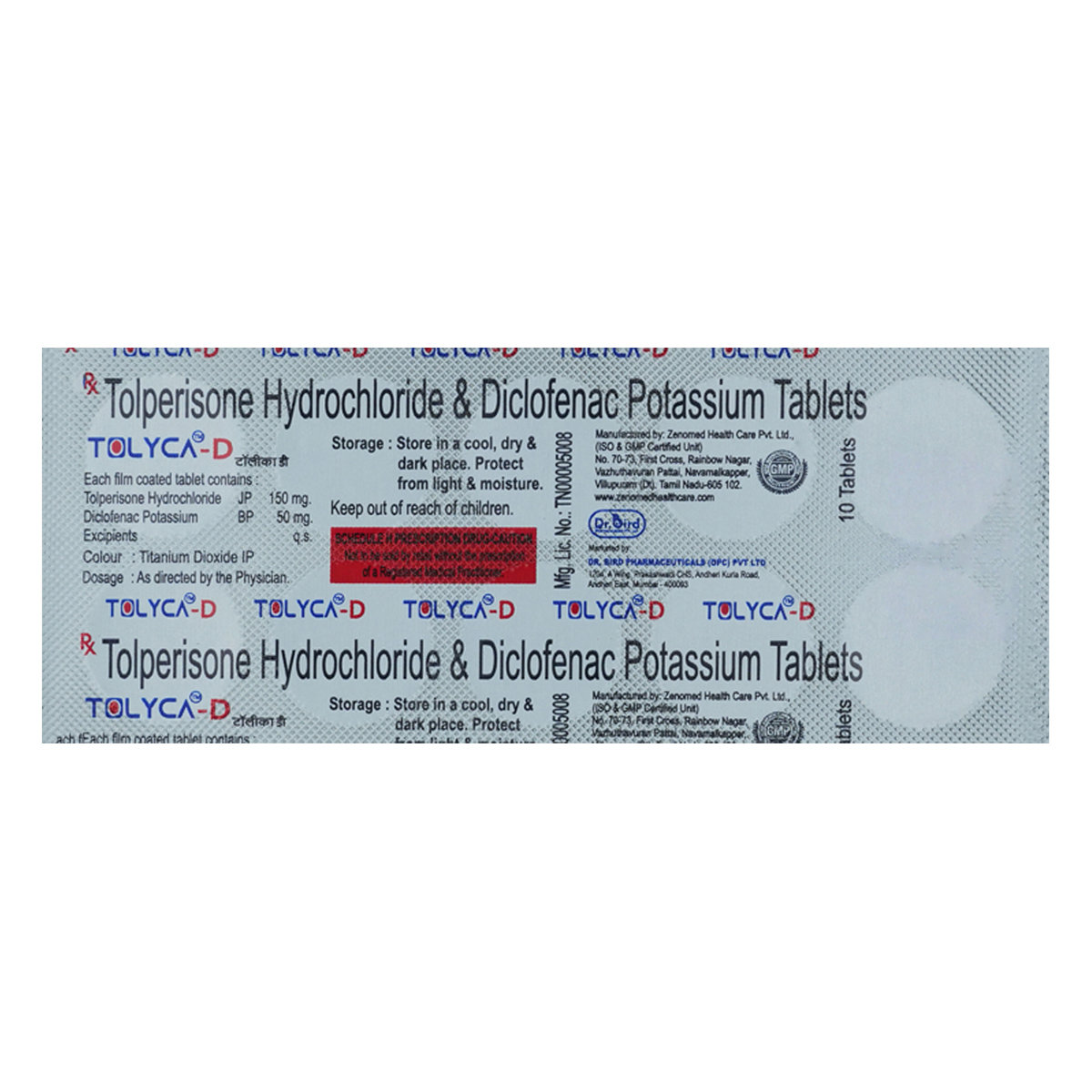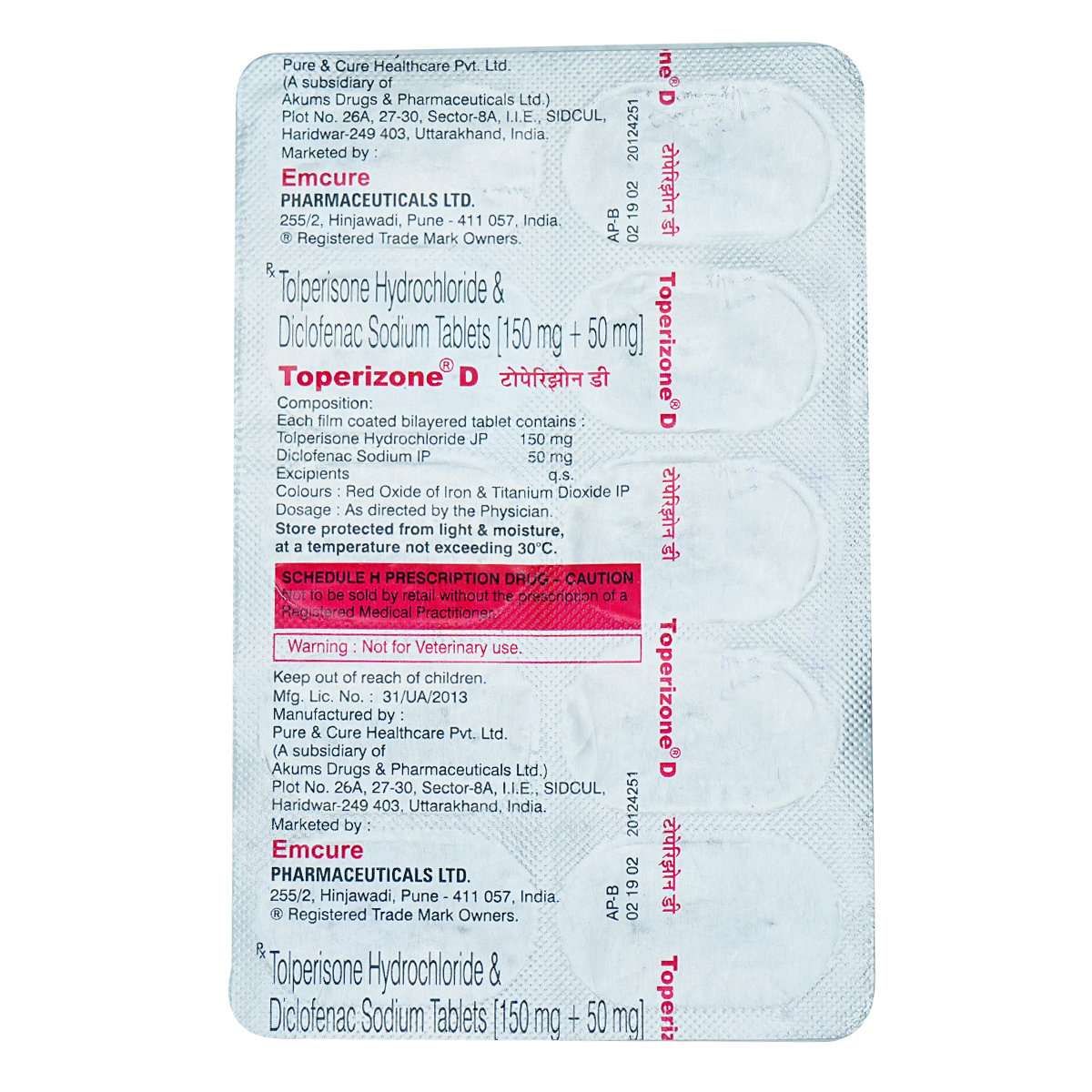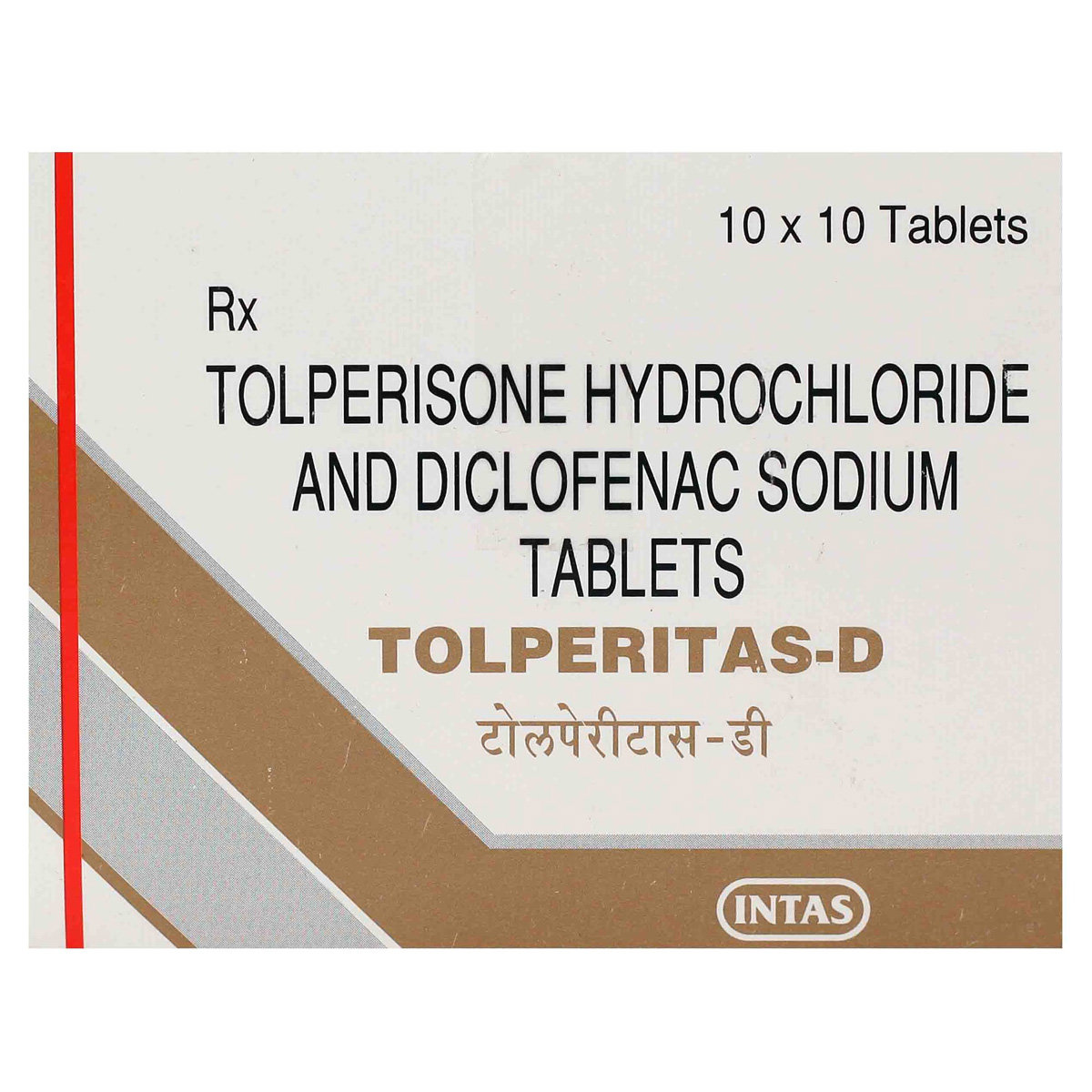Reladol D Tablet 15's
MRP ₹263
(Inclusive of all Taxes)
₹39.5 Cashback (15%)
Provide Delivery Location
Online payment accepted
 Prescription drug
Prescription drugWhats That
Composition :
Manufacturer/Marketer :
Consume Type :
Expires on or after :
Return Policy :
About Reladol D Tablet
Reladol D Tablet belongs to a class of medications called Non-steroidal anti-inflammatory drugs (NSAIDs) or pain killer. Reladol D Tablet is used to reduce and relieve pain due to the muscle spasms (excessive tension in the muscles). Muscle spasm is the sudden involuntary contractions of the muscle, which can be painful and uncomfortable. When the nerve impulses that control the muscle movements are damaged or interrupted, it could lead to muscle spasms.
Reladol D Tablet is a combination of two drugs, namely: Diclofenac and Tolperisone. Diclofenac is a pain killer (NSAIDs) while Tolperisone is a skeletal muscle relaxant. Diclofenac works by blocking the effect of a chemical messenger in your body, known as cyclo-oxygenase (COX) enzymes that make another chemical 'prostaglandins' (PG). These prostaglandins are produced at injury sites and cause pain and swelling. By blocking COX enzyme's effect, lesser PGs are produced, which reduces mild to moderate pain and inflammation at the injured or damaged site. On the other hand, Tolperisone works on the brain and spinal cord centres to relieve muscle stiffness or spasm and relieve pain and improve muscle's movement.
Take Reladol D Tablet as prescribed by your doctor. You are advised to take Reladol D Tablet for as long as your doctor has prescribed it for you depending on your medical conditions. You may experience nausea, diarrhoea, vomiting, heartburn, weakness, stomach pain/epigastric pain, sleepiness, dizziness, and appetite loss. Most of these side effects of Reladol D Tablet do not require medical attention and gradually resolve over time. However, if the side effects are persistent, reach out to your doctor.
Reladol D Tablet can increase your risk of fatal heart attack or stroke. So, if you have had any recent heart surgery, do not use Reladol D Tablet . Reladol D Tablet increases the chances of stomach ulcers and bleeding. Before taking this Reladol D Tablet , inform your doctor if you have any allergies, myasthenia gravis (weakness in muscles), asthma, and hay fever. To treat your condition effectually, continue taking Reladol D Tablet for as long as your doctor has prescribed. Do not take Reladol D Tablet if you are pregnant or breastfeeding unless prescribed. Reladol D Tablet causes drowsiness and dizziness, so drive with caution. Reladol D Tablet should not be given to children as safety and efficacy have not been established. Avoid consuming alcohol along with Reladol D Tablet as it could lead to increased drowsiness and dizziness, it might also increase the risk of stomach bleeding. Keep your doctor informed about your health condition and medicines to rule out any side-effects.
Uses of Reladol D Tablet
Directions for Use
Key Benefits
Reladol D Tablet belongs to a class of medications called Non-steroidal anti-inflammatory drugs (NSAIDs) or pain killers. Reladol D Tablet is a combination of two drugs, namely: Diclofenac and Tolperisone. Diclofenac is a pain killer (NSAIDs) while Tolperisone is a skeletal muscle relaxant. Diclofenac works by blocking the effect of a chemical messenger in your body, known as cyclo-oxygenase (COX) enzymes that make another chemical 'prostaglandins' (PG). These prostaglandins are produced at injury sites and cause pain and swelling. By blocking COX enzyme's effects, lesser PGs are produced, which reduces mild to moderate pain and inflammation at the injured or damaged site. On the other hand, Tolperisone works on the brain and spinal cord centres to relieve muscle stiffness or spasm and relieve pain and improve muscle's movement. Altogether Reladol D Tablet relieves pain and relaxes the muscles.
Storage
- Inform your doctor about the nausea and discuss possible alternatives to the medication or adjustments to the dosage.
- Divide your daily food intake into smaller, more frequent meals to reduce nausea.
- Opt for bland, easily digestible foods like crackers, toast, plain rice, bananas, and applesauce.
- Avoid certain foods that can trigger nausea, such as fatty, greasy, spicy, and smelly foods.
- Drink plenty of fluids, such as water, clear broth, or electrolyte-rich beverages like coconut water or sports drinks.
- Use ginger (tea, ale, or candies) to help relieve nausea.
- Get adequate rest and also avoid strenuous activities that can worsen nausea.
- Talk to your doctor about taking anti-nausea medication if your nausea is severe.
- Record when your nausea occurs, what triggers it, and what provides relief to help you identify patterns and manage your symptoms more effectively.
- High levels of liver enzymes need immediate medical attention.
- Watch your diet and consume low-fat foods, like green leafy vegetables, fish, whole grains, nuts, etc.
- Regularly do strengthening exercises to control your cholesterol levels.
- Avoid drinking alcohol as it can affect your liver.
- Focus on losing weight as it can help control cholesterol and maintain liver enzymes.
- Practice yoga and meditation to improve liver functioning and overall health.
- Limit processed foods and eat more vegetables and fruits.
- Exercise at least 30 minutes every day.
- Maintain a healthy weight.
- Quit smoking as it can worsen kidney damage.
- Control your blood pressure and blood glucose.
- Limit salt intake and alcohol consumption.
- Increased creatinine levels must be corrected immediately with the help of a doctor.
- Reduce strenuous activities that can lead to muscle breakdown and production of creatinine.
- Sleep for 7-8 hours per night to assist your body in repairing and rebuilding tissue.
- Manage your blood pressure by implementing changes in lifestyle like losing weight, reducing stress and exercising regularly.
- Avoid smoking and drinking alcohol.
- Report the itching to your doctor immediately; they may need to change your medication or dosage.
- Use a cool, damp cloth on the itchy area to help soothe and calm the skin, reducing itching and inflammation.
- Keep your skin hydrated and healthy with gentle, fragrance-free moisturizers.
- Try not to scratch, as this can worsen the itching and irritate your skin.
- If your doctor prescribes, you can take oral medications or apply topical creams or ointments to help relieve itching.
- Track your itching symptoms and follow your doctor's guidance to adjust your treatment plan if needed. If the itching persists, consult your doctor for further advice.
- Include iron-rich foods like dark leafy vegetables, lean red meat, legumes and fish in your diet.
- Consume vitamin C-rich foods as they aid iron absorption.
- Limit tea, cocoa, and coffee as these can slow iron absorption.
- Exercise regularly; however, do not overdo it.
- Boost Vitamin K with leafy greens (spinach, kale), broccoli, cauliflower, and cabbage.
- Include iron-rich foods like lean red meat, legumes, fortified cereals, and dark leafy greens.
- Stay hydrated by drinking plenty of water.
- Add Vitamin C-rich foods (citrus fruits, bell peppers) to enhance iron absorption.
- Limit excessive alcohol and blood-thinning foods like garlic and certain herbs.
- Engage in gentle exercise like walking, swimming, or yoga.
- Monitor injuries and apply pressure to wounds promptly.
- Schedule regular medical checkups for routine blood tests.
Drug Warnings
Reladol D Tablet can increase your risk of fatal heart attack or stroke. So, if you have had any recent heart surgery, do not use Reladol D Tablet . Do not take Reladol D Tablet if you are allergic to Reladol D Tablet , have severe heart failure, have suffered bleeding problems such as bleeding from stomach or bowels while taking any pain killers or you have liver or kidney problems. Inform your doctor before taking Reladol D Tablet if you have or had high blood pressure, heart problems, high cholesterol, diabetes, asthma, liver and kidney problems. Do not take Reladol D Tablet if you are pregnant or breastfeeding unless prescribed. Reladol D Tablet causes drowsiness and dizziness, so drive only if you are alert. Reladol D Tablet should not be given to children as the safety have not been established. Avoid consuming alcohol and Reladol D Tablet as it could lead to increased drowsiness and increase the risk of stomach bleeding. Stop taking Reladol D Tablet and consult your doctor immediately if you have stomach pain or any signs of bleeding in intestine or stomach such as blood in stools. Do not take any other NSAID's for pain relief along with Reladol D Tablet unless prescribed. Keep your doctor informed about your health condition and medicines to rule out any side-effects.
Drug-Drug Interactions
Drug-Drug Interactions
Login/Sign Up
Co-administration of Reladol D Tablet with Meloxicam can increase the risk or severity of gastrointestinal side effects.
How to manage the interaction:
Taking Meloxicam with Reladol D Tablet is not recommended as it can possibly result in an interaction, it can be taken if your doctor has advised it. However, consult your doctor immediately if you experience symptoms such as dizziness, lightheadedness, red or black, tarry stools, coughing up or vomiting fresh or dried blood that looks like coffee grounds, severe headache, and weakness. Do not stop any medication without doctor's advise.
Taking Reladol D Tablet with Enoxaparin can increase the risk of bleeding complications.
How to manage the interaction:
There may be a possible interaction between Reladol D Tablet and Enoxaparin, but they can be taken together if your doctor has prescribed them. However, consult your doctor immediately if you experience any unusual bleeding or bruising, swelling, vomiting, blood in your urine or stools, headache, dizziness, or weakness. Do not discontinue any medications without consulting a doctor.
Coadministration of Reladol D Tablet with Ketoconazole may increase the risk of liver problems.
How to manage the interaction:
There may be a possible interaction between Reladol D Tablet and Ketoconazole, but they can be taken together if a doctor has prescribed them. However, consult a doctor immediately if you have fever, chills, joint pain or swelling, unusual bleeding or bruising, skin rash, itching, loss of appetite, fatigue, nausea, vomiting, abdominal pain, dark colored urine, light colored stools, and/or yellowing of the skin or eyes. Do not discontinue any medications without consulting a doctor.
Taking Reladol D Tablet with human immunoglobulin may increase the risk of kidney problems.
How to manage the interaction:
Although there is an interaction between Human immunoglobulin and Reladol D Tablet, you can take these medicines together if prescribed by a doctor. However, consult the doctor immediately if you experience symptoms such as nausea, vomiting, loss of appetite, increased or decreased urination, sudden weight gain or weight loss, fluid retention, swelling, shortness of breath, muscle cramps, tiredness, weakness, dizziness, confusion, and irregular heart rhythm. Do not discontinue any medications without consulting a doctor.
Taking Reladol D Tablet with Ibrutinib can increase the risk of bleeding tendencies.
How to manage the interaction:
There may be a possible interaction between Reladol D Tablet and Ibrutinib, but they can be taken together if a doctor has prescribed them. However, consult a doctor immediately if you experience any unusual bleeding, dizziness, lightheadedness, red or black, tarry stools, coughing up or vomiting fresh or dried blood that looks like coffee grounds, or severe headaches. Do not discontinue any medications without consulting a doctor.
Co-administration of Reladol D Tablet with Celecoxib may increase the risk of stomach bleeding and ulcers.
How to manage the interaction:
Although there is a interaction between Reladol D Tablet and Celecoxib, but it can be taken if your doctor has advised it. Consult a doctor if you experience symptoms like blood in your urine or stool (or a black stool), severe bruising, prolonged nosebleeds, feeling dizzy or lightheaded, weakness or severe headache, vomiting blood or coughing up blood, heavy menstrual bleeding (in women), difficulty breathing, or chest pain. Do not discontinue any medication without consulting a doctor.
Co administration of Reladol D Tablet with Leflunomide may result in liver problems.
How to manage the interaction:
Co-administration of Reladol D Tablet and Leflunomide can lead to an interaction; it can be taken if advised by your doctor. However, if you have a fever, chills, joint pain or swelling, unusual bleeding or bruising, skin rash, itching, loss of appetite, fatigue, nausea, vomiting, abdominal pain, dark-colored urine, light-colored stools, or yellowing of the skin or eyes. Do not stop using any medication without consulting your doctor.
Concomitant administration of Reladol D Tablet and furosemide may decrease the therapeutic efficacy of furosemide and adversely affect renal function.
How to manage the interaction:
There may be a possible interaction between Reladol D Tablet and furosemide, but they can be taken together if your doctor has prescribed them. However, consult your doctor immediately if you experience symptoms like nausea, dizziness, irregular heartbeats, altered blood pressure, tingling. Do not stop using any medications without first talking to your doctor.
Co-administration of Reladol D Tablet and tenofovir alafenamide may cause kidney problems.
How to manage the interaction:
There may be a possible interaction between Reladol D Tablet and Tenofovir alafenamide but they can be taken together if your doctor has prescribed them. However, consult your doctor immediately if you experience symptoms such as such as nausea, vomiting, loss of appetite, increased or decreased urination, sudden weight gain or weight loss, fluid retention, swelling, shortness of breath, bone pain, muscle cramps, tiredness, weakness, dizziness, confusion, and irregular heart rhythm. Do not stop using any medications without talking to your doctor.
Taking Dasatinib together with Reladol D Tablet may increase the risk of bleeding.
How to manage the interaction:
There may be a possible interaction between Reladol D Tablet and Dasatinib but they can be taken together if a doctor has prescribed them. However, consult a doctor immediately if you experience dizziness, red or black, tarry stools, or severe headaches. Do not discontinue any medications without consulting a doctor.
Drug-Food Interactions
Drug-Food Interactions
Login/Sign Up
Diet & Lifestyle Advise
- Exercising regularly helps in muscle stretching so that they are less likely to spasm, tear and sprain. Mild exercises such as jogging and walking are helpful for muscle stretching.
- Massages can also be helpful.
- Avoid freezing and hot temperatures.
- Avoid wearing tight-fitting clothes, instead, wear loose garments.
- Rest well, get plenty of sleep.
- To avoid developing pressure sores, change your position at least every two hours.
- Hot or cold therapy can help treat muscle spasms. Apply an ice-pack or hot-pack on the muscle for 15-20minutes.
- Stay hydrated, drink plenty of water.
Side Effects of Reladol D Tablet
- Nausea
- Diarrhoea
- Vomiting
- Loss of appetite
- Heartburn
- Weakness
- Stomach pain/epigastric pain
- Sleepiness
- Dizziness
- Numbness and tingling
- Ringing in the ears
Habit Forming
Therapeutic Class
All Substitutes & Brand Comparisons
RX
Myocom D Tablet 15's
Alteus Biogenics Pvt Ltd
₹168
(₹10.09 per unit)
36% CHEAPERRX
Telpimeg-D Tablet 15's
Megma Healthcare Pvt Ltd
₹190
(₹11.4 per unit)
27% CHEAPERRX
Tolperin-D Tablet 10's
Solis Pharmaceuticals
₹131
(₹11.79 per unit)
25% CHEAPER
Drug-Diseases Interactions
Drug-Diseases Interactions
Login/Sign Up
FAQs
Drug-Drug Interactions Checker List
- ALLOPURINOL
- ASPIRIN
- CYCLOSPORINE
- FUROSEMIDE
- METHOTREXATE
Special Advise
- Applying ice pack to the affected area may help in relieving pain and inflammation.
- Avoid grapefruit juice.
Disease/Condition Glossary
Pain is a symptom triggered by the nervous system, causing uncomfortable sensations in the body. Muscle spasm is the sudden involuntary contractions of the muscle, which can be painful and uncomfortable. When the nerve impulses that control the muscle movements are damaged or interrupted, it could lead to muscle spasms. Symptoms include muscle tightness, joint stiffness, unusual posture, difficulty moving, pain in affected muscles and joints. Fatigue (weakness), stress, extreme heat or cold, infection, and tight clothing can trigger muscle spasms. Muscle relaxants and exercise can treat muscle spasms. Muscle relaxants sedate the muscle and help in inhibiting painful contractions. Whereas, exercise helps in muscle stretching to be less likely to spasm, tear and sprain.

Have a query?
Alcohol
Safe if prescribed
Avoid consumption of alcohol while taking Reladol D Tablet as it may increase dizziness. It can also increase the risk of stomach bleeding.
Pregnancy
Consult your doctor
Avoid taking Reladol D Tablet if you are pregnant unless prescribed by a doctor. Please consult your doctor if you have any concerns regarding this, your doctor will prescribe only if the benefits outweigh the risks.
Breast Feeding
Consult your doctor
Reladol D Tablet must not be used during breastfeeding.
Driving
Safe if prescribed
Reladol D Tablet may cause sleepiness or dizziness. Do not drive or do anything needing concentration until you know how it affects you.
Liver
Consult your doctor
Those who have severe liver problems should not take this Reladol D Tablet because Reladol D Tablet contains Tolperisone, which causes the most dangerous adverse in patients with liver disease.
Kidney
Consult your doctor
Those who have severe kidney problems should not take this Reladol D Tablet because Reladol D Tablet contains Tolperisone, which causes the most dangerous adverse in patients with kidney disease.
Children
Safe if prescribed
Reladol D Tablet should not be given to children as the safety and effectiveness were not established.




